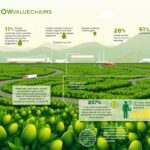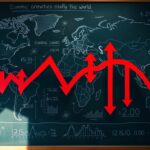A recent study in PLOS Climate shows a worrying trend. Corporations are now using “soft denial” tactics to hide their environmental harm.
This alarming strategy is not a full denial of climate change. Instead, it subtly lessens its impact. By employing climate obstruction tactics, companies appear environmentally friendly while prioritizing profits.

This is a big problem. Corporate greenwashing tricks people and leaders, slowing down climate action.
Key Takeaways
- Corporations are using “soft denial” to downplay their environmental impact.
- This tactic involves subtly undermining the severity of climate change.
- Climate obstruction tactics are being employed to maintain a veneer of environmental responsibility.
- Corporate greenwashing can mislead consumers and policymakers.
- These tactics are hindering efforts to address the climate crisis.
The Evolution of Climate Denial
Corporations have changed how they talk about climate change. They now use more subtle ways to influence people and slow down action on climate. This shift shows a bigger plan to shape public views and hold off on real climate action.
From Outright Denial to Subtle Obstruction
Previously, the fossil fuel industry vehemently denied the existence of climate change. But as science grew stronger, they started using softer ways to block climate efforts. “Soft denial” is now common, using greenwashing to seem less harmful.
The Rise of Corporate Greenwashing
Greenwashing has become a big part of climate denial. Companies pretend to care about the environment so it looks better. But they keep doing harm.
Historical Context of Environmental Messaging
For years, companies have used green talk to their benefit. In the 1980s, some fossil fuel firms talked up cleaner energy. Yet, they kept investing in old, dirty fuels.
Transition to More Sophisticated Deception
As more people learned about climate change, companies got smarter. They started using words like “sustainability” and “climate responsibility.” This practice made it seem like they were doing something when they weren’t.
“The more it changes, the more it remains the” same“—this saying fits the evolution of climate denial. Companies have found new ways to delay climate action.
Understanding Corporate Greenwashing Soft Denial Tactics
As corporations face more scrutiny over their environmental impacts, a new tactic has emerged: ‘soft denial’ strategies. This shift means companies now use more subtle ways to hide their true environmental impact. They move from outright denial to more hidden forms of deception.
Defining “Soft Denial” in Climate Discourse
“Soft denial” is when companies downplay their environmental harm without saying they don’t believe in climate change. This scenario includes greenwashing, picking and choosing what to share, and other tricks to hide their real ecological footprint.
By using “soft denial,” companies try to seem like they’re fighting climate change, even if they’re not really doing it. They might make symbolic gestures or promises that don’t actually help.
How It Differs from Traditional Climate Denial
“Soft denial” is different from old-school climate denial. Instead of saying climate change doesn’t exist, it says it’s real but not a big deal. This strategy lets companies act like they care about the environment while doing things that harm it.
Psychological Impact on Consumers
The “soft denial” approach can significantly confuse consumers. It makes them confused and less likely to trust environmental claims. When people see mixed messages from companies, they start to doubt and lose interest.
Effectiveness in Delaying Meaningful Action
“Soft denial” works well because it makes people think companies are doing something about climate change. By making vague promises or doing small actions, companies can shift focus away from real changes.
In short, knowing about “soft denial” is key to fighting corporate greenwashing. By spotting these tactics, we can demand real change from companies and governments on climate issues.
The PLOS Climate Study: Breaking New Ground
The PLOS Climate study is a big step forward in understanding how companies hide their environmental harm. It sheds light on how companies shape climate policies and public views.
Key Findings of the Groundbreaking Report
Companies are increasingly employing “soft denial” rather than outright denying the existence of climate change. They do this by taking symbolic actions, misdirecting attention, and pushing blame on individuals.
Research Methodology and Data Sources
The study used a detailed research method. It looked at company communications, climate policies, and lobbying. The data came from company reports, regulatory filings, and public statements.
Scientific Consensus on Corporate Obstruction
The study shows scientists agree that corporate blocking slows down climate action. Companies use many ways to slow down or weaken climate laws, making the climate crisis worse.
Quantifiable Impacts on Climate Policy
The study found that corporate blocking has resulted in significant delays and the implementation of weaker regulations. This delay has hurt global efforts to fight climate change.
The PLOS Climate study emphasizes the need for companies to be more open and responsible about the environment. As we face the climate crisis, it’s key to understand and fight corporate “soft denial” to take effective action.
Five Common Soft Denial Strategies Employed by Corporations
Corporations use soft denial tactics to hide their role in the climate crisis. These methods are less obvious than denial, but they also delay climate action.
Symbolic Actions and Empty Pledges
Many companies make big promises about going green. They set high targets for cutting carbon emissions or launch eco-friendly products. But often, these promises are empty, with no real changes made.
For example, a company might say it will be carbon neutral by 2050. But it doesn’t say how it plans to get there.
Strategic Misdirection and Attention Shifting
Some companies try to distract from their environmental harm. They focus on small, unrelated good deeds or minor green efforts. Their behavior makes it seem like they’re doing a lot for the planet, when they’re not.
Weaponizing Uncertainty in Climate Science
Companies sometimes question the certainty of climate science. They say it’s too complex to act on. Such reasoning creates doubt and delays action on climate change.
Emphasizing Individual Responsibility Over Corporate Accountability
Companies often blame consumers for environmental problems. They say it’s up to us to make a difference. But their argument ignores the big impact of corporate actions and their responsibility to be green.
Promoting Technological Solutions Without Implementation
Companies promise that new tech will solve the climate crisis. They invest in research and partner with tech firms. But without plans to use these solutions, they stay in the lab.
Knowing these soft denial strategies helps us fight corporate greenwashing. It pushes for real action on climate change.
Fossil Fuel Industry: Leading Practitioners of Climate Obstruction
The fossil fuel industry has been a major obstacle in fighting climate change. They use many tactics to slow down action on climate. Their strategies include denying climate change, lobbying against it, and spreading false messages.
Historical Patterns of Denial and Deception
The fossil fuel industry has long denied climate change. Companies like ExxonMobil knew about climate risks in the 1970s but kept funding denial campaigns. This deliberate deception has greatly delayed global action on climate.
Current Lobbying and Political Influence Tactics
Today, the fossil fuel industry uses lobbying and donations to influence climate policy. They aim to weaken or block rules that cut greenhouse gas emissions. With their money and connections, they can shape the political discourse and protect their interests.
Case Studies: ExxonMobil, Shell, and BP’s Messaging Evolution
Big fossil fuel companies have changed their messages as public concern about climate grows. ExxonMobil focuses on tech solutions, while Shell and BP say they’re moving to renewables. Critics say these actions are just greenwashing. They believe these companies still support fossil fuels and oppose real climate policies.
Beyond Fossil Fuels: Other Industries Adopting Soft Denial
Other industries are quietly working against climate action, just like fossil fuel companies. The banking, financial, transportation, automotive, and consumer goods sectors are using “soft denial” tactics. They are making it seem like they support climate action, but they don’t really.
Banking and Financial Institutions’ Climate Contradictions
Big banks and financial groups are funding green energy while investing in fossil fuels. For example, top US banks have big investments in coal, oil, and gas. Their behavior shows “soft denial.” They appear to support green efforts but continue to profit from harmful activities
Transportation and Automotive Sectors’ Green Promises
The car and transportation industries are also using “soft denial.” They promote electric cars but fight for weaker emissions rules. This mixed message confuses people and slows down the shift to greener transport.

Consumer Goods and Retail Companies’ Sustainability Claims
Consumer goods and retail companies use “sustainability” to sell their products. They often make false claims about their products’ green benefits. They might highlight a product’s recyclable packaging but ignore its big environmental impact. For instance, some focus on recyclable packaging but don’t talk about their production’s carbon footprint.
These industries use “soft denial” to keep doing things as usual, even as people worry more about climate change. Knowing these tricks helps us spot and fight corporate greenwashing better.
The Environmental and Social Impact of Greenwashing
More companies are using greenwashing, which has big environmental and social costs. This tactic not only tricks consumers but also harms the planet and people.
Delayed Climate Action Consequences
The delayed climate action caused by greenwashing is very harmful. Greenwashing deceives people into believing they are making progress when they are not. The practice lets companies keep pollution while pretending to be green.
Public Trust Erosion
Greenwashing hurts public trust in companies’ environmental promises. When people find out a company is lying, they lose faith in all environmental claims.
Consumer Cynicism and Eco-Anxiety
Greenwashing makes people skeptical and worried about the environment. As the gap between what companies say and do grows, people doubt the value of eco-friendly choices.
Market Distortion Effects
Greenwashing messes up the market by making it unfair. Companies that really care about the environment struggle against those that just pretend.
The effects of greenwashing block real progress toward a better environment. As we face climate change, we must tackle greenwashing seriously.
Regulatory Responses to Corporate Climate Deception
Regulatory bodies are stepping up to fight corporate climate deception. They are working hard to stop greenwashing. This is because companies are making false or exaggerated environmental claims.
Current Legal Frameworks in the United States
The U.S. has many laws to stop deceptive business practices, like greenwashing. The Federal Trade Commission (FTC) and the Securities and Exchange Commission (SEC) are key. They watch over what companies say about the environment.
Recent FTC and SEC Enforcement Actions
The FTC and SEC have taken big steps against greenwashing. The FTC has made rules for environmental marketing claims. The SEC has looked closely at companies that make false climate claims.
State-Level Initiatives Against Greenwashing
States like California and New York are also fighting greenwashing. They have laws to make companies more transparent about their environmental claims.
California’s Environmental Marketing Claims Act
California’s law makes sure environmental claims are true. It helps consumers know the real environmental impact of products.
New York’s Climate Leadership and Community Protection Act
New York’s law is a big deal for the environment. It requires companies to be more transparent about their climate actions. It also sets big goals for reducing climate change.

The rules are changing to tackle corporate climate deception. As rules get tougher, companies need to be honest about their environmental claims.
Key Takeaways:
- Regulatory bodies are increasing their scrutiny of corporate environmental claims.
- Both federal and state-level initiatives are being implemented to combat greenwashing.
- Corporations must prioritize transparency and accuracy in their environmental marketing to avoid regulatory action.
Spotting and Countering Soft Denial in Corporate Communications
Learning to spot ‘soft denials’ in corporate messages is key to the battle against climate change. As companies use sneaky ways to hide their environmental harm, it’s up to us to stay alert.
Red Flags in Sustainability Reports and Climate Pledges
Looking at corporate sustainability reports, some signs point to ‘soft denial.’ Please be mindful of pledges that lack clear goals or deadlines. Furthermore, watch for discrepancies between what’s promised and what’s done. Additionally, avoid deceiving others by emphasizing minor achievements while neglecting significant environmental issues.
Questions Consumers and Investors Should Ask
To fight ‘soft denial,’ ask tough questions:
- What specific steps is the company taking to cut its carbon emissions?
- How does the company track and share its environmental effects?
- Do the company’s green goals match up with global efforts like the Paris Agreement?
Tools and Resources for Verifying Environmental Claims
There are numerous methods to verify whether companies are being truthful about their green initiatives. Use independent audits and ratings from groups like CDP (formerly known as the Carbon Disclosure Project). You can also look at government databases and non-profit groups that monitor corporate green performance.
By knowing these warning signs and asking the right questions, we can find and challenge ‘soft denial’ in corporate messages.
Greenwashing Trends Forecast Through 2025
As companies face more criticism, we expect them to change their greenwashing ways. With stricter rules and more informed customers, they will try to look greener without making significant changes.
Evolving Tactics in Response to Increased Scrutiny
As they face more scrutiny, companies will use new greenwashing tricks. These might include:
- Using complex data to seem like they’re making progress
- Making small, cosmetic changes to policies or products
- Telling stories to highlight small environmental wins
The Role of AI and Digital Media in Amplifying Soft Denial
AI and digital media will play a big part in greenwashing’s future. Companies might use AI to craft personalized, believable stories about their green efforts. Digital platforms will help spread these messages far and wide.
Emerging Industries Adopting These Practices
New industries will likely use these greenwashing methods too. Two areas that might be quick to adopt are
Technology Sector’s Carbon Neutrality Claims
The tech world, with its rapid growth and big environmental footprint, will make more carbon neutrality promises. These promises might come from investing in green energy or carbon offsets. But they might not show a real drop in the sector’s carbon output.
Agricultural Industry’s Sustainability Narratives
The farming sector, which is a significant source of greenhouse gases, might also engage in greenwashing. Companies could focus on sustainable farming or eco-friendly products. But they might not talk about the big environmental effects of their whole operation.
As these trends grow, it’s key for everyone to watch out and check if companies really mean it when they say they’re green. Such information is important for both consumers, regulators, and investors.
Conclusion: Moving Beyond Denial Toward Authentic Climate Action
Corporations need to go beyond just saying they care about the climate. They must take real steps to fight the growing climate crisis. Many companies, especially in the fossil fuel sector, use greenwashing. This practice has slowed efforts to reduce harmful emissions.
To be truly accountable, companies should be open and honest about their climate efforts. They should focus on real, measurable actions to reduce their environmental harm. This means avoiding actions that look good but don’t really help.
Regulators, consumers, and investors have the responsibility to verify the veracity of companies’ climate actions. By pushing for real change and holding companies to their promises, we can move faster to a greener future.
We must focus on real actions to fight climate change, not just words. The task requires a team effort from businesses, governments, and people to put the planet first, even if it’s hard in the short term.
FAQ
What is “soft denial” in the context of climate change?
“Soft denial” is when companies use sneaky ways to hide their harm to the environment. It’s different from outright denial because it’s more subtle and tricky.
How do corporations use “soft denial” to greenwash their environmental practices?
Companies use “soft denial” by doing symbolic actions and misdirecting attention. They also promote tech solutions without actually using them. This approach creates a fake image of being eco-friendly.
What are some common “soft denial” strategies used by corporations?
Companies often make empty promises and distract from their real environmental harm. They also use science doubts and push for tech fixes that don’t happen. They make people think it’s all up to individual actions.
How does the fossil fuel industry contribute to climate obstruction?
The fossil fuel industry has a long history of denying and hiding the truth. Now, they use lobbying and political power to block real climate action. Companies like ExxonMobil, Shell, and BP are examples.
Are industries beyond fossil fuels adopting “soft denial” tactics?
Yes, other industries like banking, transportation, and retail are also using “soft denial.” They make claims that don’t match their real actions, confusing people about their green efforts.
What is the impact of greenwashing on the environment and society?
Greenwashing slows down climate action, erodes trust, and distorts markets. It makes it harder to tackle the climate crisis and protect our planet.
How can consumers and investors spot and counter “soft denial” in corporate communications?
People can watch for red flags in reports and pledges. Ask tough questions and use tools to check environmental claims. This technique helps make better choices.
What regulatory measures are in place to combat corporate climate deception?
Agencies like the FTC and SEC are taking action. States are also stepping up to fight greenwashing and push for truth in environmental claims.
How might greenwashing trends evolve through 2025?
As scrutiny grows, greenwashing tactics will likely change. AI and digital media might make “soft denial” even sneakier. New industries might start using these tricks too.
What is corporate climate deception, and how does it relate to “soft denial”?
Corporate climate deception includes all tactics, like “soft denial,” to fool the public and policymakers. It’s about hiding the truth about their environmental actions and climate efforts.
What are some key findings of the PLOS Climate study on corporate obstruction?
The PLOS Climate study shows how companies block climate action. It quantifies the harm and reveals their tactics. This investigation illuminates the science behind corporate obstruction.









































































































